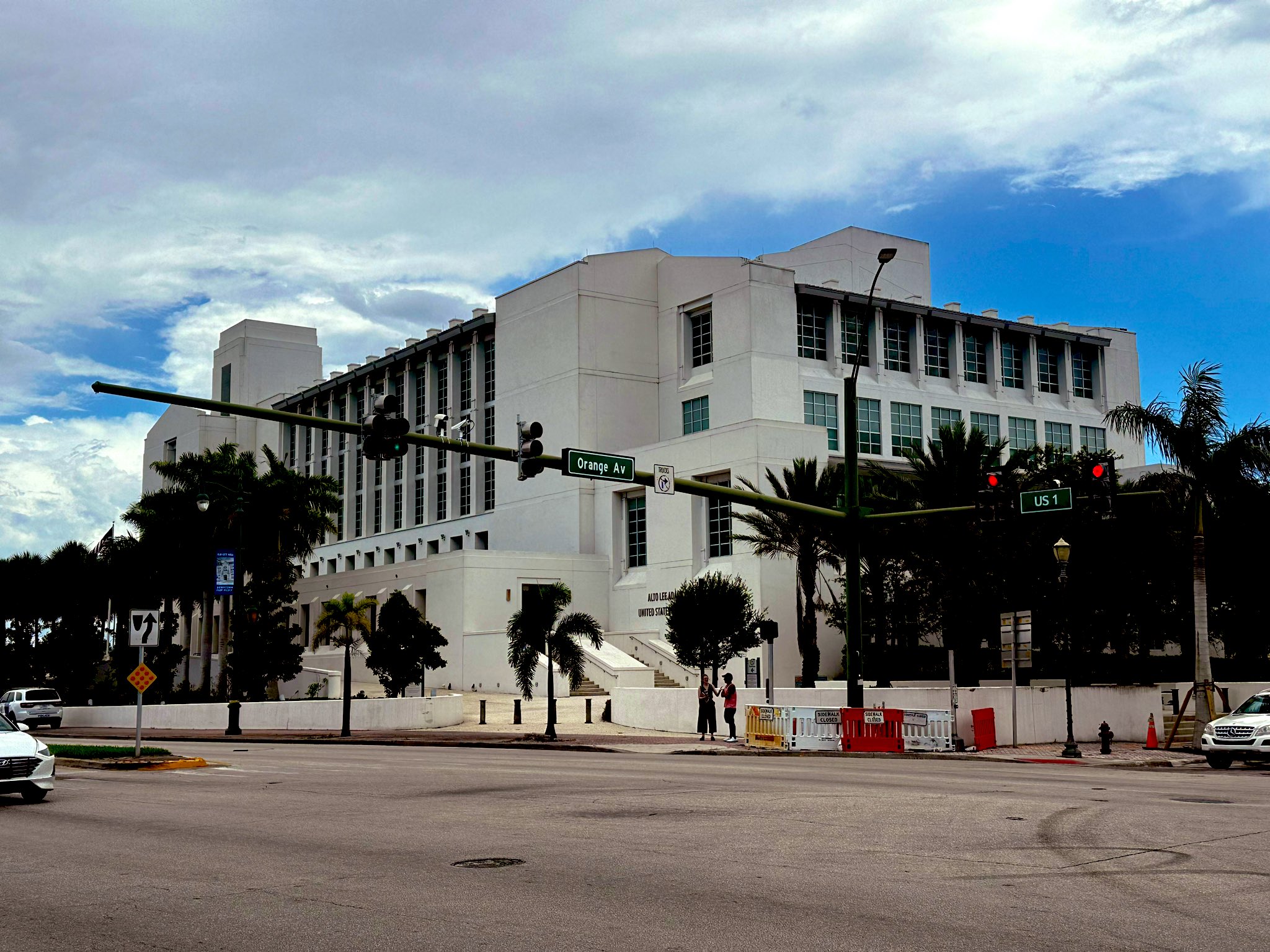Today's Headlines and Commentary
In a bizarre, sprawling news conference that was the first of his presidency, Trump claimed that he “inherited a mess” and attacked his critics and the intelligence community.
Published by The Lawfare Institute
in Cooperation With

In a bizarre, sprawling news conference that was the first of his presidency, Trump claimed that he “inherited a mess” and attacked his critics and the intelligence community. The president also took time to aim his displeasure at the news media, continuing to attack them for reporting on former National Security Adviser Michael Flynn’s conversations with the Russian ambassador to the United States, his conversations with foreign leaders, and for reports today on the intelligence community’s relationship with Trump. Claiming that “the leaks are real, the news is fake,” the President said that the Justice Department will look into the issue of leaking, though he neither gave credence to the substance of the leaks themselves nor provided evidence as to why the leaked information should not be taken seriously.
The New York Times reports that Trump plans to have New York billionaire Stephen A. Feinberg lead a broad review of American intelligence agencies, which Trump sees as responsible for the leaks that led to Flynn’s resignation. The involvement of Feinberg, a co-founder of the private equity firm Cerberus Capital Management and a close friend of Trump’s chief strategist Steve Bannon and son-in-law Jared Kushner, has met with fierce resistance by the intelligence community, who fear that it could curtail their independence and reduce the flow of information that contradicts the president’s worldview. Top intelligence officials are also concerned that Feinberg is being groomed for a top-level role in the intelligence community.
The move comes as the Wall Street Journal tells us that U.S. intelligence officials have withheld sensitive intelligence from Trump because they are concerned that it could be leaked or compromised by individuals in the White House. The decision to keep certain information from Trump underscores the deep mistrust between the intelligence communities and the president over his and his team’s contacts with the Russian government. The agencies, when withholding information, have often chosen not to reveal information on sources and methods, but this is the first time that a decision to withhold information has been motivated by a concern over the president’s trustworthiness or discretion. The officials who spoke to the Journal made clear that they know of no instance in which crucial information about security threats or potential plotting was omitted.
Reuters tells us that the Trump administration plans “in the near future” to rescind President Donald Trump’s executive order banning immigration from seven Muslim-majority countries and replace it with a revised order, according to officials at the Justice Department. DOJ has asked the 9th Circuit to hold its consideration of Washington v. Trump until the new order is issued and then vacate its previous decision against the government.
ABC News writes that yesterday, Trump said he can “can live with” either a two-state or a one-state solution in Israel, saying “I like one that both parties like.” The statement, made during a joint press conference with Israeli Prime Minister Benjamin Netanyahu before their private meeting, breaks with decades of U.S. policy. Trump also urged Netanyahu to “hold back on settlements a little bit,” and said that Palestinians were going to “have to get rid of some of the hate that they are taught from a very young age.”
Reuters notes that U.N. Secretary-General Antonio Guterres said that “there is no alternative solution for the situation between the Palestinians and Israelis, other than the solution of establishing two states, and we should do all that can be done to maintain this” during a visit to Cairo. Guterres spoke before Trump’s press conference in response to reports that Trump would forsake a the two-state solution, condemning the Israeli parliament’s move to legalize thousands of settler homes in the occupied West Bank as illegal under international law earlier this month.
The Journal tells us that the United States and its Middle Eastern allies are exploring an Arab military coalition that would share intelligence with Israel to counter the influence of Iran. The alliance would initially include Saudi Arabia and the United Arab Emirates as well as Egypt and Jordan, with the United States providing military and intelligence support. For those countries involved, the alliance would have a NATO-style mutual defense component under which an attack on one member would constitute an attack on all.
Reuters notes that Russian President Vladimir Putin said this morning that it was in the interests of both Russia and the United States to restore communications between their respective intelligence agencies. “It’s absolutely clear that in the area of counter-terrorism all relevant governments and international groups should work together,” was Putin’s claim during an address to Russia’s Federal Security Service, or FSB.
Defense Secretary James Mattis said that the United States is “not in a position right now,” to forge military ties with Russia, according to ABC News. “The point about Russia is that they have to live by international law just like we expect all mature nations on this planet to do,” Mattis said in Brussels, where he is meeting with defense ministers from NATO member countries.
CNN informs us that Trump tweeted yesterday that Crimea was “taken” by Crimea, and questioned whether the Obama administration was “too soft” on Russia over its illegal takeover of Crimea. The comments mark a sharp turn for Trump, who during the campaign trail had suggested that perhaps Russia have a legitimate claim on Crimea.
The Post writes that General Joseph Dunford, Jr., the chairman of the Joint Chiefs of Staff, will meet with his Russian counterpart today in the first meeting of the countries’ leading generals since the Russian intervention in Ukraine and its annexation of Crimea in 2014. Dunford will be meeting with Valeriy Gerasimov, the chief general of the Russian armed forces, in Baku, Azerbaijan, as lawmakers increase their scrutiny of Trump advisers’ contacts with Russian officials and amplify their criticism of Russian hostility against the United States.
The Hill reports that members of the Senate Judiciary Committee have sent a letter to Attorney General Jeff Sessions and FBI Director James Comey requesting a briefing and documents tied to Flynn’s resignation. Senators Chuck Grassley (R-Iowa) and Dianne Feinstein (D-Calif.), the chairman and ranking members of the committee respectively, also requested in the letter that wanted copies of the transcript of Flynn’s “intercepted calls and the FBI report summarizing the intercepted calls referenced in the media.”
The Post examines what will become of those members of the National Security Council that were brought in by Flynn now that he has departed.
CNN informs us that at least 30 people were killed in a suicide attack this morning at Pakistan’s Lal Shahbaz Qalandar shrine in Sindh province, and that as many as 100 more were injured. The Islamic State Khorasan, ISIS’s affiliate in Afghanistan and Pakistan, claimed responsibility for the attack in a phone call to CNN. Hundreds were gathered at the iconic shrine for the Sufi ritual of Dhamal during the attack. The attack comes just days after a bomb blast went off in Lahore, Pakistan, killing 14 people and injuring 59 more.
CNN also tells us that the Pentagon might propose that the United States send conventional ground troops into northern Syria for the first time to speed up the fight against ISIS. The move, which is ultimately up to Trump, would significantly alter U.S. military operations in Syria and could have troops on the ground within weeks. Until now, only special operations units have operated in Syria, providing training and assistance to groups fighting against ISIS.
ABC News reports that there is some confusion as to whether ISIS leader Abu Bakr al-Baghdadi was wounded in an airstrike that took place yesterday, with U.S. officials skeptical of the claim. While the Iraqi military said that the ISIS chief had been “critically injured,” by the strike, U.S. counterterrorism officials are skeptical of the military’s claim that Baghdadi was present in the targeted city of al-Qa’im at all. Iraqi officials have claimed many times in the past that the ISIS leader had been wounded or killed in airstrikes, only to have Baghdadi issue a statement or audio recording later to rally his followers.
The Guardian writes that attorneys for two CIA contract psychologists who helped design the agency’s brutal interrogations of suspected terrorists have asked a federal judge to order Gina Haspel, a career CIA official who was recently appointed deputy director of the agency, to provide a deposition detailing her involvement in the episode. Haspel served as the deputy of former National Clandestine Service Director Jose Rodriguez allegedly aided him in destroying nearly 100 videotapes depicting torture of the first two black-site detainees, sparking a Senate investigation that led to the Senate Select Committee on Intelligence’s report on the CIA torture program.
ICYMI: Yesterday, on Lawfare
Susan Hennessey and Helen Murillo examined the laws surrounding government leaks and examined what a White House response to recent leaking might mean for executive information control.
Benjamin Wittes highlighted another instance of President Trump tweeting about an article that he most likely didn’t read.
Jane Chong discussed House Permanent Select Committee on Intelligence Chairman Devin Nunes’ attacks on the FBI’s conduct in the Flynn investigation.
Jack Goldsmith asked more questions about White House Counsel Donald McGahn’s involvement in the Flynn imbroglio.
Ben posted the Rational Security podcast: The “Out Like Flynn” Edition.
Bobby Chesney posted the fourth episode of the National Security Law Podcast: Flynn, Borders, and PRBs.
Nora Ellingsen examined Harold Thomas Martin III’s indictment and arraignment.
Jake Laperruque pointed out that closing Section 702’s “backdoor search loophole” would require companion reforms to use restrictions.
Email the Roundup Team noteworthy law and security-related articles to include, and follow us on Twitter and Facebook for additional commentary on these issues. Sign up to receive Lawfare in your inbox. Visit our Events Calendar to learn about upcoming national security events, and check out relevant job openings on our Job Board.




.jpg?sfvrsn=6b10cf8f_5)
